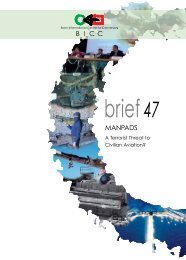egypt-final-presidential-elections-2012
egypt-final-presidential-elections-2012
egypt-final-presidential-elections-2012
Create successful ePaper yourself
Turn your PDF publications into a flip-book with our unique Google optimized e-Paper software.
The Carter Center<br />
Presidential Election in Egypt<br />
administrative court ruling on April 10, <strong>2012</strong>. 16<br />
With the constitution no closer to being drafted and<br />
a lack of clarity on when and how it would be <strong>final</strong>ized,<br />
the electoral preparations for the <strong>presidential</strong><br />
election began.<br />
Political Maneuvering and the<br />
Candidate Nomination Process<br />
Preparations for the <strong>presidential</strong> election commenced<br />
in early March with the preparation of the voters’<br />
register and the start of the candidate nomination<br />
period, a period that was marked by a series<br />
of dramatic twists<br />
and turns. Late in the<br />
process, the Muslim<br />
Brotherhood reversed<br />
its earlier decision not<br />
to field a <strong>presidential</strong><br />
candidate and nominated<br />
not one, but two candidates<br />
— Khairat El Shater,<br />
the Brotherhood’s deputy<br />
leader and main financier<br />
as well as Mohamed<br />
Morsi, then chairman of<br />
the Freedom and Justice Party. Shortly thereafter,<br />
former intelligence chief Omar Suleiman entered the<br />
race with what was seen by many as the explicit goal<br />
of countering the Brotherhood’s influence. Shater<br />
and Suleiman were eventually disqualified on technical<br />
grounds by the PEC. Shater was disqualified<br />
for having been sentenced to a prison term under<br />
Mubarak (though the conviction was widely regarded<br />
as being politicized), while Suleiman was removed for<br />
being 31 signatures short in his registration application.<br />
Ayman Nour, who faced off against Mubarak<br />
in Egypt’s first multicandidate <strong>elections</strong> in 2005, also<br />
was disqualified for a previous conviction that was<br />
regarded as politically motivated. And <strong>final</strong>ly, the<br />
Salafist populist candidate Hazem Abu Ismail was<br />
disqualified when it was proved that his late mother<br />
had previously acquired U.S. citizenship. 17 In the end,<br />
Preparations for the <strong>presidential</strong> election<br />
commenced in early March with the<br />
preparation of the voters’ register and the<br />
start of the candidate nomination period,<br />
a period that was marked by a series of<br />
dramatic twists and turns.<br />
of the 23 Egyptian citizens who initially registered as<br />
candidates, only 13 proceeded to the first round of<br />
the election.<br />
The First Round of the Presidential<br />
Election: May 23–24, <strong>2012</strong><br />
The top two candidates who garnered about 25<br />
percent of the vote each and proceeded to the runoff<br />
were Mohamed Morsi and Ahmed Shafiq, former<br />
general, aviation minister, and last-serving prime<br />
minister under Mubarak. Morsi and Shafiq were<br />
followed in the results by the Nasserite candidate<br />
Hamdeen Sabahi, who<br />
received 20 percent of<br />
the vote; former senior<br />
Muslim Brotherhood<br />
member Abdel Moneim<br />
Aboul Fatouh with 17<br />
percent; and former<br />
Arab League head Amr<br />
Moussa with 11 percent.<br />
Other candidates who<br />
got votes from the left<br />
and from labor and youth<br />
groups included Khalid<br />
Ali, a labor organizer and human rights activist;<br />
Hisham Bastawisi, a senior judge who was involved<br />
in the movement for greater judicial independence;<br />
and Abul-Ezz El-Hariri, a socialist labor activist and<br />
former parliamentarian.<br />
It is worth noting that approximately 50 percent<br />
of all eligible voters who participated in the first<br />
round of the election chose not to vote either for the<br />
16 The constituent assembly was later re-formed in early June <strong>2012</strong>,<br />
following multiparty negotiations on its composition. Although this<br />
constituent assembly remained intact throughout both rounds of the<br />
<strong>presidential</strong> election, several members, mainly non-Islamists, have<br />
resigned from it, citing alleged Islamist domination of the body. The new<br />
constituent assembly has also faced renewed court challenges, including<br />
a claim that the constituent assembly is invalid because its selection (in<br />
part) by members of the People’s Assembly rendered it invalid following<br />
the dissolution of the People’s Assembly by the Supreme Constitutional<br />
Court.<br />
17 Candidates’ parents, by law, must have Egyptian citizenship exclusively<br />
throughout their lives.<br />
9



